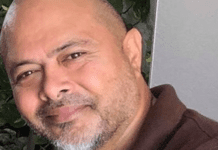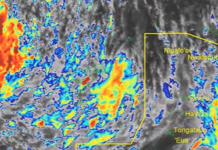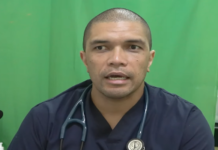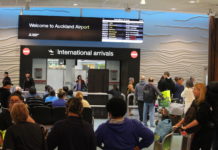‘Oku taupotu ‘i lalo ha fakamatala fakaTonga
There was no evidence a new variant of Covid-19 causes more severe illness according to a University of Otago expert.

The XBB1.5 variant now accounts for about 40% of cases in the US, according to data from the Centers for Disease Control and Prevention.
Symptoms with XBB.1.5 are the same as with earlier variants and can range from almost nothing to shortness of breath and low oxygen levels that require emergency medical attention.
Professor Peter McIntyre from the University of Otago said XBB.1.5 appeared to be similar to other variants of Omicron, RNZ reported.
He said it may be more likely to cause infection, including in people who had been vaccinated or infected before.
The existence of a new variant was not important in itself. What mattered was if there was any evidence that it caused not just breakthrough infection, but that it resulted in severe illness, he said.
In New Zealand the number of reported case numbers has fallen, as has the number of people hospitalised.
Globally, other experts have cautioned against over-reacting to the new variant.
In the United States an official from the CDC official said there was no indication it caused more severe illness than other Omicron variants.
Dr Barbara Mahon, director of CDC’s Coronavirus Division, told the American NBC network that while the number of people in hospital in the US with Covid was rising, areas with high levels of the new variant, such as the northeast, did not have a disproportionate increase in hospitalisations.
The number of people hospitalised at this time was well below last year’s Omicron surge.
The XBB.1.5 variant has been detected in the UK and is thought to account for about four percent of Covid viruses being sequenced.
Professor of clinical microbiology at Cambridge University, Ravi Gupta, told the Guardian he thought the new variant might drive an increase in cases, but he not necessarily an explosive wave of infections in the UK.
“I don’t think there’s any cause to panic. The main thing we worry about is the severity of the disease, and there is no evidence that it’s more severe. People should, however, make sure they are up-to-date with their vaccines,” Professor Gupta said.
In Canada, Dr Angela Rasmussen, a virologist at the Vaccine and Infectious Disease Organisation at the University of Saskatchewan, said she did not expect to see big changes in terms of disease severity, since infections would happen in a population where people had been vaccinated and infected with the Omicron variant.
However, while experts have been careful not to over-react to the emergence of a new variant, they have all urged people to make precautions against the virus, making sure their immunisation and boosters are up to date and taking other precautions, such as mask wearing, as necessary.
Fakamatala fakaTonga
Ko e talanoa ‘eni ki he fōtunga kehe fo’ou XBB1.5 ‘o e Koviti ‘a ia ko e pēseti ia ‘e 40 ‘o e ngaahi keisi ‘i US, fakatatau ki ha teita mei he Senita ki he Disease Control and Prevention.
Ko e ngaahi faka’ilonga ‘o e XBB.1.5 ‘oku tatau pe mo e ngaahi fotunga kehe ki mu’a ange’ pea ‘oku lava ke ‘alu mei he ikai ha me’a ‘e hoko ki he nounou ‘a e mānava mo e tō lalo ‘a e levolo ‘o e ‘osikena ‘a ia ‘e fiema’u ai ha tokoni fakafale mahaki.
Kuo pehe ‘e Palōfesa Peter McIntyre mei he ‘Univesiti ‘o Otago ‘oku ngali tatau ‘a e XBB.1.5 mo e ngaahi fōtunga kehe ‘o e ‘Omikoloni’. Na’a’ ne pehē ‘e malava pe ke ne fakatupu ha puke, pea ‘e malava ke toe puke pe ai ‘a e kakai ne ‘osi huhu malu’i pe pihia ki mu’a’.
‘I Nu’u Sila’, kuo holo ‘a e tokolahi ‘o e ngaahi keisi na’e lipōti’ tatau pe mo e fika ‘o kinautolu ne tākoto fale mahaki’. Fakamāmani lahi’, oku tokanga ‘a e kau mataotao kehe’ ki he fu’u hoha’a ki he fōtunga kehe fo’ou’. ‘I ‘Amelika’, na’e pehē ‘e ha ‘ofisiale mei he CDC na’e ‘ikai ha faka’ilonga te ne fakatupu ha puke lahi laka ange he ngaahi fōtunga kehe ‘o e ‘Omikoloni’.
Ne pehē ‘e Dr Barbara Maho, ko e talēkita ‘o e CDC’s Coronovirus Division ‘i ha’ane lau ki he American BNC ko e lolotonga na’e mahiki ‘a e tokolahi ‘o kinautolu ma’u ‘e he Koviti’ ne ‘i fale mahaki ‘i ‘Amelika’ na’e ‘ikai ta’e hohoatatau ‘a e fakalalahi ‘a e tākoto fale mahaki ia ‘i ngaahi feitu’u hangē ‘i he Tokelau hahake’.
Ko e tokolahi ‘o e kakai kuo ‘i fale mahaki ‘i he taimi peheni ‘o e ta’u kuo ‘osi he ‘oho ‘a e ‘Omikoloni’, ‘oku fu’u si’isi’i ‘aupito ia.
Ko e fōtunga fo’ou ko ‘eni XBB.1.5 kuo ‘asi ia ‘i UK pea ‘oku ‘i ai ‘a e tui ko e pēseti ia ‘e fā ‘o e vailasi Koviti kotoa kuo lava ke fakahokohoko’.
Pehē ‘e Palōfesa Ravi Gupta mei he ‘Uivēsiti ‘o Cambridge ki he Guardian na’a ne fakakaukau ‘e ala fakalahia ‘e he fōtunga fo’ou’ ha tupulaki ‘i he ngaahi keisi’, ka e ‘ikai ko ha fu’u tupu fēfē ia ‘i UK. Me’a tatau pe ‘i Kanata fakatatau kia Dr Angela Rasmussen ko e vilolosisi he univesiti ‘o Saskatchewan, ‘a ia na’a ne pehe ‘e ‘ikai ha ‘amanaki ki ha toe mapuna ‘a e mahaki ‘i he ngaahi feitu’u ne ‘osi huhu malu’i mo puke ai ‘a e kakai he ‘Omikoloni’.
Neongo ia ne fale’i ‘e he kau mataotao’ ki he kakai ke ‘oua ‘e fu’u tokanga tōtu’a ki he ‘asi ‘a e fōtunga fo’ou, kuo nau fakalotolahi’i ‘a e kakai ke nau tokateu ‘o fakafepaki’i ‘a e vailasi ‘aki ‘a e fakapapau’i ‘oku muiaki fakakakato ‘a honau huhu malu’i mo e hoani’ mo e ngaahi malu’i kehe hangē ko e masaki’.







